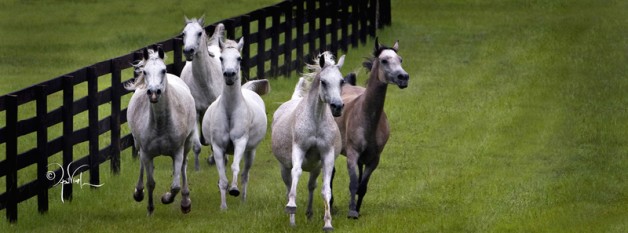The Arabian Horse Foundation has announced $11,500 in equine research funding for support of projects studying health conditions impacting Arabian horses.
An award of $5,000 will go to continuing the cerebellar abiotrophy research being conducted by Cecilia Penedo, PhD, at the University of California, Davis (UC Davis), School of Veterinary Medicine’s Veterinary Genetics Laboratory. Another $6,500 will go to support two projects headed by Samantha Brooks, PhD, of the University of Florida College of Veterinary Medicine: One project researching equine metabolic syndrome and Cushing’s disease in the Arabian horse, and another to expand studies of heritable disease in the Arabian horse and study the genetic basis for juvenile idiopathic epilepsy.
“This is the foundation’s sixth year for funding equine veterinary related research projects and it is very fulfilling to see the ongoing interest and progress that has been made during this time, particularly in the area of studying genetic disorders affecting the Arabian horse,” said Beth Minnich, who chairs the foundation’s Equine Research Advisory Panel. “This has only been possible with the support of our donors and their dedication to helping the Arabian horse community have a voice in equine research.”
In addition to Minnich, the Equine Research Advisory Panel is made up of Ray Cerniga, DVM, PAS; Tim Fleck, DVM; and Cory Soltau, DVM.
Since 2008, the foundation has been supporting Penedo’s cerebellar abiotrophy research project at UC Davis. Minnich noted the new $5,000 award “will assist in further study of the mutation associated with cerebellar abiotrophy and what mechanisms are responsible for the cellular changes in the brain which result in the clinical signs of cerebellar abiotrophy. Not only will this give us a better understanding of the disease, but also potentially provide future therapy options for horses affected with cerebellar abiotrophy.”
Cerebellar abiotrophy is a degenerative condition of the brain that is caused by the death of neurons called Purkinje cells, resulting in a severe lack of coordination. Affected horses are often euthanized and evidence indicates that the condition is found in a wide variety of bloodlines within the Arabian breed.
Brooks’ $6,500 award is in part a continuation of an equine metabolic syndrome and Cushing’s disease project which the foundation has been supporting since 2010.
“This year’s funds will go toward supporting work to thoroughly validate an identified gene of interest,” Minnich explained. “The information gained from this project is expected to lead to further understanding of the genetic component of these conditions.”
A frequent complication of equine metabolic syndrome and Cushing’s disease is laminitis, which is one of the most common causes of lameness and death in horses.
In addition, Brooks will also be starting a project to study the genetic basis for juvenile idiopathic epilepsy, a seizure condition that can affect very young horses.
“The intent for this project is to initiate an archive for DNA samples for horses with a juvenile idiopathic epilepsy diagnosis and to also genotype these samples for lavender foal syndrome, to determine if there is any connection between these two neurologic conditions,” Minnich said.
This latest round of funding brings the total given by the foundation to equine research in the last six years to over $55,000.



